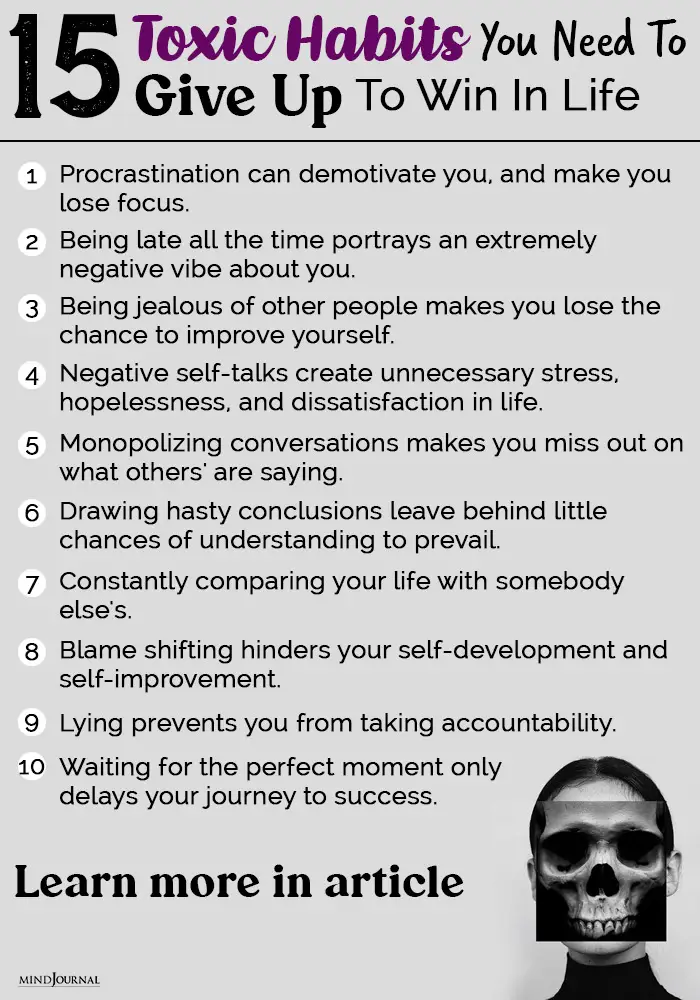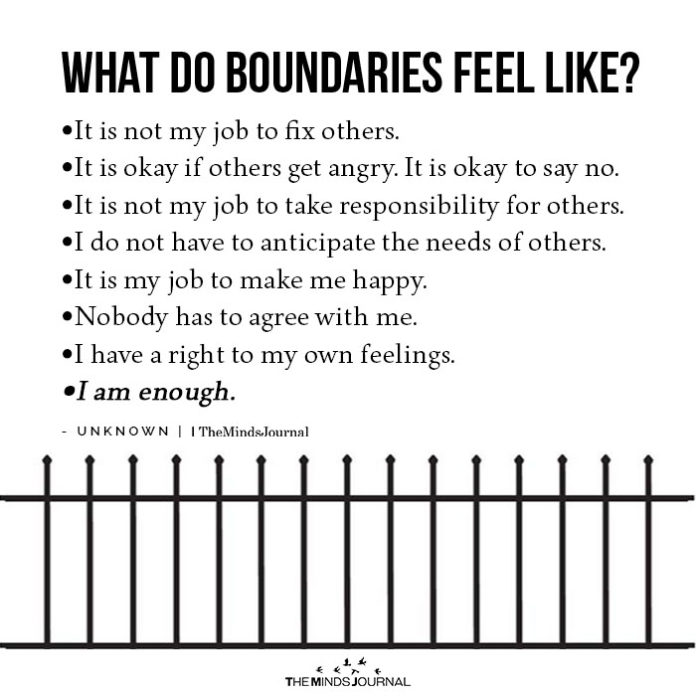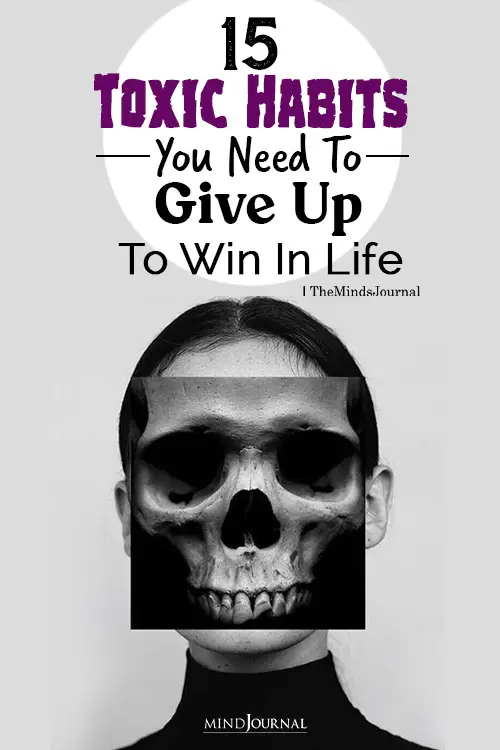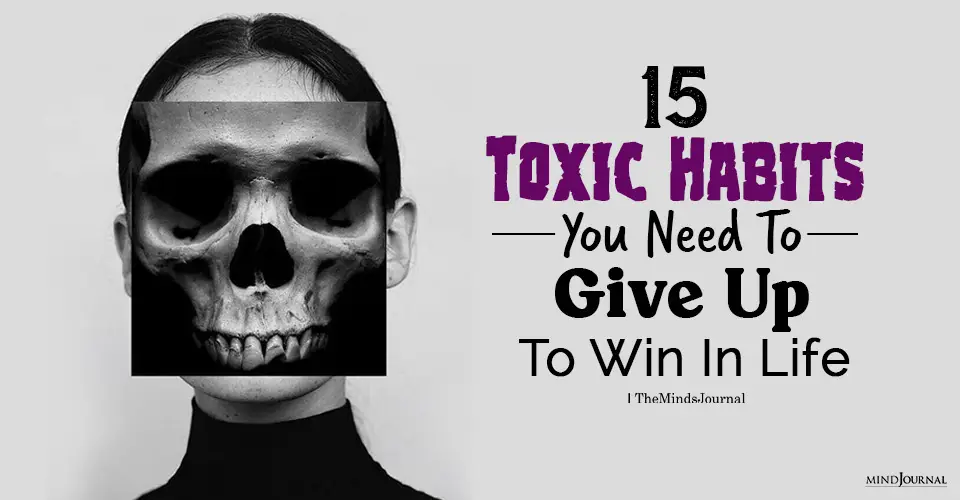Sometimes all it takes to spoil our mood is to ruminate about the ugly decisions of our life. There are moments galore when we feel like our life is completely meaningless. We wish we could be more zealous and our life would be more happening. We often compare our dull lives with the glamorous lives of our peers and lament about our miserable circumstances.
Ever wondered where your true happiness is sneaking away? Look deeper. Maybe you are vandalizing your own happiness with your toxic habits.
Happiness doesn’t come gift-wrapped in a box, it really needs to be created. For this, you have to take up action to limit your self-destructive habits and let your life breathe some fresh air.
Understanding Toxic Habits
Toxic habits are behaviors & fixed patterns of response to a varied range of stimuli present in both our internal and external environments, which are self-sabotaging in nature. Like any other habit, these often get so ingrained in our personality that it turns rigid and apparently unchangeable. One keeps swirling around in these toxic habits struggling to slip out of it. Easily understandable that these behaviors will interfere with your productivity, leading you to feel incapacitated of reaching your optimal potential. These habits will truly gnaw on your spirits and make life a difficult place to be.
Related: Am I Toxic? 20+ Signs That Say You’re Toxic
These habits are born out of our comfort zone and thrive on ignorance. This is what makes it more difficult to identify and get rid of these toxic habits. Once we start becoming self-inquisitive about the truth that is keeping us away from success, it will be easier for us to start making amends.
Here Are 15 Toxic Habits That We Should Immediately Do Away With

1. Procrastinating.
If you never find yourself starting any urgent work soon enough, you might not only be losing focus but also delaying it unknowingly. According to Piers Steel, 95% of us procrastinate to some degree. {1} It’s definitely relaxing to know that there are others like you, but it’s disheartening to know that it can hold you back from so much.
Procrastination essentially means diverting our conscious attention and focus to interesting, pleasant, favorable yet comparatively unimportant tasks to avoid, delay and abandon important and urgent tasks that demand your immediate attention and perseverance.
Over time, procrastination can demotivate you, make you lose focus and opportunities to showcase your potential. These, in turn, can lead to lowered life satisfaction, hopelessness, loss of job, extreme stress, and even depression.

2. Turning up late.
Every one of us has been late on rare occasions due to a number of factors.
But if you frequently find yourself being considerably late in most circumstances, sooner or later this will turn into a toxic pattern.
Often being late reflects your attitude about the work or task at hand. It portrays how lackadaisical, disorganized and unprofessional you are in dealing with other people and their time.
By being late all the time, you only send an extremely negative vibe about yourself which shows that self-centered enough to only consider your time to be important and devalue other people’s time.
3. Being jealous of other people.
The only monster we should be scared of is the green-eyed monster in our head. Being jealous of other people’s fortunes only speaks so much about you.
Jealousy stems from low-esteem and a lack of feelings of satisfaction with oneself. If your feelings of jealousy are keeping you from constantly moving on with your life and being satiated by anything at all, you are stuck with a toxic habit.
Jealousy makes you lose the chance to improve yourself and only focus on the goodness in others and lament one’s conditions.
Related: 7 Things To Remember When You Feel Broken Inside
4. Negative self-talks.
Repeat this to yourself – Negative thoughts and words will only negatively impact your life.
According to Psychology Today, if we scan the brain of a person who was shown the word ‘no’ on the screen for less than a second, dozens of stress-producing hormones and neurotransmitters would be released. If exposure to negative stimuli for less than just one second can have that impact on you, then imagine what a constant implication of negative words you speak to yourself can have on your mind and body.
Negative self-talks create unnecessary stress, hopelessness, and dissatisfaction in life.
Negative self-talk like “I can’t do it.” “I am incapable.” “I will never be able to do it.” Will only set you in a negative mental set and hold you back from achieving and evolving into your best version. Avoid words like “can’t, never, no” and other negative phrases from your vocabulary and replace them with self-enhancing positive self-talks like “I am enough”, “I can”, “I am capable” etc. and see how your life takes a turn towards goodness.
5. Monopolizing conversations.
At the end of a conversation do you feel like you learned nothing about the other person?
It is not unusual to keep talking about oneself while conversing with someone. You, I and every one of us loves to talk about ourselves. But a conversation is an exchange and expression of ideas and thoughts between two people. It involves the alternative actions of speaking and listening.
Every conversation is a new experience from which you can increase your knowledge. If you keep blabbering without letting the other person express anything at all, you might miss out on learning crucial information from them.
6. Reaching quick conclusions.
Quick conclusions are easy to draw but are often drawn on the basis of insufficient information and on shaky logical grounds.
Drawing hasty conclusions in discussions and arguments leave behind little chances of understanding to prevail. Quick conclusions about someone’s intentions, personality, and expression can lead to misunderstanding, especially in any form of intimate interpersonal relationship.
Logically analyze and observe every situation through the open and non-judgemental lens and then reach conclusions to avoid reaching biased and incorrect conclusions.
Related: 8 Daily Habits That Are Secretly Damaging Your Brain
7. Comparing one’s life with others’ lives.
Everybody has their own growing rates. Comparison sets us on a toxic competitive mindset and does not allow us to breathe at our own pace.
Consider this: You have a life of your own, your dreams, your plans, and your milestone is completely distinct from other people’s dreams, goals, and milestones. Are there any common grounds to compare your life with someone else’s?
Instead of comparing your life with other people’s focus on your objectives and start improving yourself. You will start living the life you dreamt of without needing to worry about how successful, happy, and rich other people are.
8. Blame shifting.
Your blaming, when it began, was probably an innocent defense mechanism meant to protect you from harm. If your sister was to blame for eating the cookies, then she would be punished—not you. But sometimes, blaming takes a turn toward the dysfunctional, when blaming becomes your default reaction to life, causing harm to you and others.
Blaming, when dysfunctional, is a way to avoid and deny feeling what you are feeling. While it may not be conscious, blaming is something you do to get away from the feelings you do not want to feel.
But I feel lots of things when I blame, you might argue. And it is true that you do feel when blaming, but you feel something other than what you would if you could not blame. In this way, blaming conceals and distorts your real truth—you replace your feelings about what you are experiencing with feelings about who caused it.
At its core, blaming is a form of self-abandonment and self-betrayal, writes Nancy Colier in Psychology today.
It apparently keeps you away from having to mend yourself and face the reality that there is something in you that needs to be addressed. Blame shifting hinders your self-development and hence the best idea is to drop this habit.
9. Lying.
We have all lied at some point in time. Lies that are unreasonable, unaccounted, and frequented are toxic in nature. It turns into a poor habit of getting one’s way out by denying accountability.
People who lie don’t want to take responsibility for their actions and hence send a negative image about themselves. Lying can be an addictive habit as it helps gain temporary control of a situation.
Once people find out that you are a habitual liar, you are most likely to lose friends and acquaintances.
10. Waiting for the perfect moment.
Perfect moments don’t exist. The moment you decide to work on your life and things that are of significance to you is the perfect moment. Every single moment in your life is perfect if you can make the most out of it.
Waiting for the perfect moment only delays your journey to success. Stop thinking and start acting. Right away.
Related: 27 Lessons I Learned In 27 Years To Staying In The Present Moment
11. Settling.
Are you happy being mediocre? If yes, you might be settling for the average.
Your journey to success starts outside your comfort zone. When you set lower standards for yourself, you are actually limiting your potential. Maybe, you could have scaled greater heights with the project you turned down with an excuse to yourself.
Lack of self-confidence, low self-esteem, fear of uncertainty are some of the reasons why we settle for less than what we deserve. Often, the risky step you are refraining yourself from taking can open doors to better opportunities. Deject stagnation and embrace change. Your life needs it.
12. Not setting personal boundaries.
Not setting well-defined and non-negotiable personal boundaries is another toxic habit that will keep you from winning in life.
Setting personal boundaries means to set limits on other people’s behavior towards you which helps determine which of their actions are acceptable and which are unacceptable. It acts like a shield that protects our dignity, our freedom, and rights and helps us make reasonable decisions in our life.
Setting and managing personal boundaries is a form of self-care everyone must indulge in. Learning to say ‘no’, rejecting other people’s opinions to pursue your own, not tolerating lies, staying away from toxic people are some of the actions which you should never feel guilty of taking.
In the long run these boundaries will help you save time, effort and keep away from being unduly used by others.

13. Living in the past.
We all know it’s a toxic habit but we still can’t manage ourselves out of it. Let’s remind you once again – your past is irreversible. You can hardly do anything about your past other than learn from it.
A loss of a job, an unsuccessful career, separation from a romantic partner, divorce, death of a close person, estrangements bring about disheartenment and grief. Often such profoundly impactful incidents leave a mark on our lives and we give in to suffering for the rest of our lives.
I am not invalidating the pain and negativity you encountered in your past. All I am asking is to learn from the incident and not latch on to it for the rest of your life. Take your time. It might take you days, months or years to accept your past. But once you are strong enough to read with logic, analyze and learn from it. Is there anything your past might teach you about your future?
If yes, thank your stars for it happened and keep flowing. Also, remember never to judge your future based on your past experiences.
Related: The One Thing You Need To Get Past Worries and Start Living Your Life
14. Not loving oneself enough.
We all get a little less selfish when it comes to loving oneself.
Honestly, we are too busy searching for love outside ourselves. We search for it in other people’s words and actions. Remember, you are an agent of connectivity between yourself and other people. If you cannot love yourself, you cannot extend this affection to anyone else, who-so-ever it is.
Love breeds in you. You have to cultivate it in yourself only then can you spread it further. Engage in learning more about yourself, consider your needs and wishes, treat yourself with compassion, appreciate yourself when you accomplish something worthwhile, address your own grievances, and invest in things that make you intensely happy.
Loving oneself also includes keeping oneself away from all sorts of negativity – toxic people, pessimistic environments, abusive relationships, and negative self-talk.
15. Not taking proper care of one’s health.
Living in an era of lazy busy, we plain don’t care to look after our physical and mental health.
From skipping breakfast to getting exercises descheduled, we have all been compromising our health. There’s hardly any space for healthy eating, getting enough sleep, detoxification, and relaxation in our inflexible routines. Substance dependence due to stressful life situations is another matter of concern.
Over a span of time, neglected health can get you to pay high prices for your life. Create space for healthy living alongside your packed schedule.
Identifying Toxic Habits
We have a purpose to keep feeding our toxic habits. We rationalize with ourselves well enough to let it breed and grow in us because they temporarily satiate us. Identifying such habits might be a bit tough. But these won’t take much effort if you make up your mind to stand for a change.
Things to remember while revealing your toxic habits:
1. Look within yourself.
If you have already read the article till this, you might have some of the toxic habits out of the few aforesaid ones in mind.
Choose a calm place and a silent place. Sit down with a pen and paper. Introspect and search for answers deep within yourself. Ask yourself, can I relate to any of the habits mentioned in this article?
If you can, write them down one by one, leaving enough space in between each point. Write as many as you can. If you can think of, write even the ones not mentioned in this article.
2. Be logical.
Make two columns under each point and name it ‘pros’ and ‘cons’. Think deep. Analyze and reason out the pros and cons of each habit. Do not distort reality.
Ask yourself:
1. How are these habits helping in developing myself?
2. Is my life going to be a better place without these habits?
3. How are these habits holding me back in life?
4. Are these habits yielding in the long run?
Circle those habits which have the most number of ‘cons’. You need to work on these habits before the other ones.
Related: STOP Killing Your Self-Esteem: 5 Habits You Need To Change Now
3. Consider being self-compassionate.
Do not be self-critical and harsh on yourself. Be gentle, compassionate, and loving towards oneself yet rational, purposeful, and committed to identifying and mending these toxic habits.
Remind yourself of the purpose of revealing these toxic habits. It is not to disparage or offend oneself but to evolve oneself.
4. Retrospect.
Listen to what others have to say about you. Pay more attention to what people close to you are often commenting about you. Are their comments subtle yet powerful insights on your habits?
“You must listen a bit more to the other person in a conversation.”
Don’t get offended and disregard these types of statements from people who share an intimate relationship with you.
You are one step away from conquering the world. Toxic habits may leech around with you but as soon as you get rid of them, the world will suddenly seem to be a better place.
Reference: 1. https://www.ncbi.nlm.nih.gov/pmc/articles/PMC5964561/










Leave a Reply
You must be logged in to post a comment.